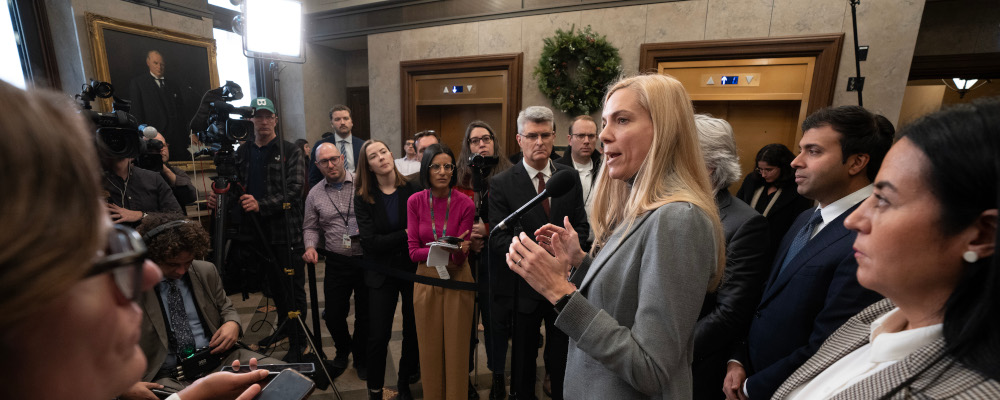The government this morning released the final Online News Act regulations, effectively gutting the law in order to convince Google to refrain from blocking news links in Canada and to fix some of the legislative mistakes that have been apparent from the start. While proponents of the law will point to the $100 million contribution from Google as evidence of success, privately most in the industry and government acknowledge the obvious: Bill C-18 was deeply flawed and a massive miscalculation that has created far more harm than good.
Canadian Heritage Minister Pascale St-Onge seemingly agrees as she was willing to make changes that were derided by the government throughout the legislative process. Indeed, by the time St-Onge took over the file that was a challenging salvage job, Meta’s $20 million in news deals were lost and blocked news links on Facebook and Instagram were a reality. The prospect of the same happening with Google was too much for the industry and the government since the lost deals would have been at least double that amount (many believe in the $40-50 million range) and lost news links in search would have been catastrophic.
As the regulatory process unfolded in the fall, the top priority was therefore to ensure Google news links did not disappear, even if that meant essentially re-writing the legislation. That is effectively what the government did with the release of today’s final regulations and regulatory impact assessment. The $100 million from Google is likely to yield relatively little new money after subtracting $20 million lost from Meta, an estimated $50 million from existing Google spending is folded into the new funding model, and $5-6 million to cover administrative costs of the new system. In other words, the entire Canadian news industry picks up roughly $25 million in new money, set against lost links on Facebook and Instagram and lost investment in the sector due to regulatory uncertainty. That is disastrous and helps explain why the deal also comes with the government’s increased bailout for newspapers with the expanded labour journalism tax credit and the expectation that the CRTC will use Bill C-11 to funnel more money to broadcasters to cover news costs.
The relatively small amount of new money also helps explain why the government has directly engaged in determining how it will be allocated. While its Bill C-18 pitch changed over time—from payments for links to levelling the bargaining playing field—it ends with a simple shakedown. Google has money and this tax-like approach forces them to pay up to make the contentious policy battle go away. The government had claimed that it would not become directly involved in either negotiating payments or determining how the money would be allocated. It was—in the words of Rodriguez—merely setting the table for the two private sector sides to reach a deal with mandated arbitration lurking in the background.
Today’s final regulation discards both claims and overhauls the law, adding a Google-specific regulation that specifically grants it an exemption from arbitration in return for the $100 million payment and a specific reference that the payment is not about payments for links. The Google-specific provision is exhibit A for the absurdity of the legislation as it literally creates a singular exception for one company:
Despite subsection (1), in the case of the digital news intermediary that is the search engine with the greatest share of Canadian Internet advertising revenues among all search engines in respect of which the Act applies, the Commission must interpret the agreements as contributing to the sustainability of the Canadian news marketplace if and only if, for each year covered by the potential exemption order, the agreements provide for monetary compensation in accordance with the formula
The regulations also make it clear that no further “non-monetary” compensation is needed and removes the link to both links and copyright, two of the most contentious aspects of the law:
The agreement need not provide any consideration for merely facilitating access to news content or for otherwise making news content available in a manner that would fall under a limitation or exception in the Copyright Act.
Moreover, the regulations create a cap on the revenues allocated toward broadcasters and the CBC (a problem of the government’s own making), which ensures that most of the money will go to print and digital outlets (caps of 30 percent to broadcasters, 7 percent to the CBC). That’s a significant change that the government opposed for months. But not all print outlets will benefit, since the government is also tying the money to news that is “intended to be made available online” and expanding the definition of “journalist” for the purposes of calculating how much each entity might receive by including “full-time equivalent employees who, in the previous calendar year, were employed by each news business for the purpose of producing, for news outlets operated by that business, original news content that is intended to be made available online”.

The combined effect of this regulation should be obvious: excluding some smaller and ethnic outlets altogether while reserving most of the remaining money for larger entities such as Torstar or Postmedia who employ more journalist-adjacent personnel. I suspect many of the smaller players could see this coming, but they’ve been tossed under the bus in the effort to send more money to bigger outlets who stood to lose the most from Bill C-18 (and who incidentally lobbied the most for the legislation).
While not in the regulations, added to the mix is a battle to become the new fund manager. The regulations speak to “reasonable administrative expenses”, which I understand may be in the 5-6 percent range, or $5-6 million. Since Google need only negotiate with one such fund, look for a major battle between News Media Canada, the Canadian Association of Broadcasters, and perhaps other players for the shot at the administration money. There should be credit to St-Onge for sensible changes to the law (certainly politicians from all parties will be outraged to learn their local publications get nothing), but to be clear, it means the government has not only negotiated the actual payment but now largely determined how the money will be allocated, eliminated provisions that only months ago were deemed essential, and literally created a regulation exempting a single company. Together they effectively bury the original Bill C-18 and resurrect it as the law the government spent months rejecting.
This column originally appeared on michaelgeist.ca.
Recommended for You

The biggest media story of 2026—and why the mainstream press is hoping you’ll ignore it

The uncomfortable reason antisemitism is festering in Canada

‘A failed state because of this regime’: Niall Ferguson on Venezuela’s future following Trump’s capture of Maduro

‘A more dangerous world’: America’s Venezuelan invasion—should Canada be worried?



